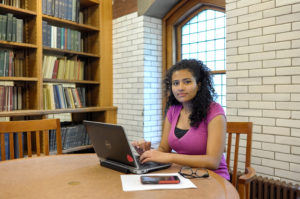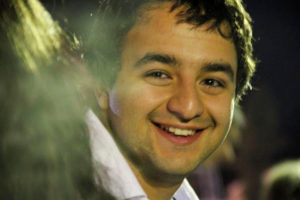Students at Lehigh are familiar with the stress that accompanies finals.
However, international students have additional pressure placed upon them. These students face extra challenges when job-searching since some companies view international students as more difficult to hire compared to natural-born citizens.
“I think when employers see it’s an international student, they aren’t always willing to hire them and even interview them because of their perception that there’s a lot of paperwork and legalities they have to deal with,” said Olga Scarpero, the assistant director of the Office of International Students and Scholars.

Kabita Karki, ‘17, sits with her schoolwork on Friday, May 5, 2017, in Linderman Library. Karki is a chemical engineer major and an international student from Nepal. (Matteo Ji/B&W Staff)
Scarpero said students must complete an employment authorization form before searching for jobs. When international students graduate, they must have a job to legally remain in the U.S. One option for students is to register for F-1 Optional Practical Training, a temporary employment benefit directly related to a student’s area of study.
Scarpero said many international students would prefer to get job experience because it makes them more marketable in their home country.
OPT allows international students to seek full-time jobs that offer practical training within the U.S. The maximum 12-month OPT can be granted once per degree level. Students in STEM fields, such as Kabita Karki, ’17, can be granted extensions.
“If I have a job, I can work in the U.S. three years after graduation,” Karki said. “If I can’t find a job within three months, I need to leave the country.”
Karki, a chemical engineer from Nepal, said she’s interviewed with multiple big companies. She heard they hired international students in the past, and when she interviewed with them, they seemed happy. However, once they asked her if she had a green card, her chances diminished.
“For international students, it’s a totally different level of difficulty,” Karki said. “It’s incredibly, incredibly hard.”
Karki said part of the difficulty of finding jobs is the political climate in the U.S. She received a job offer last week, and as part of her offer, she is required to travel to Ireland. If she wants to return to the U.S. after working in Ireland, she will have to undergo the process of renewing her visa.
“Once I go to Ireland, I might not be able to come back,” Karki said.
Basel Alnajjab, ’12, is an electrical engineer from Jordan working on his doctorate in signal processing. He said his experience with job searching was different from Karki’s.
“I never really went online to apply for jobs,” Alnajjab said. “I just used my Lehigh connections.”

Basel Alnajjab, ’12, is an electrical engineer from Jordan. Alnajjab is working on his doctorate in signal processing at Lehigh. (Courtesy of Basel Alnajjab)
Alnajjab said his search began when someone from his undergraduate days contacted him, saying they were looking for “smart people” and asked if he’d be interested. While that pursuit didn’t work out, Alnajjab had another referral from someone he knew through his research at another university and was contacted through his adviser.
“Had I not gotten these things to work,” Alnajjab said, “I would be under a lot of stress in finding jobs.”
Alnajjab said in electrical engineering, most of the available jobs are in government or military contracting where international students are prohibited from working. That left big tech firms as the most realistic option for students.
These jobs, he said, are highly competitive.
Alnajjab said international students should primarily use their networking skills, doctorate studies and adviser leads to help find jobs. He said another option is to look for postdoctoral research at other universities.
“You get to meet new people and do new things, so hopefully you can find a job,” Alnajjab said. “I got super lucky. I had one of the best cases I had ever heard of.”





Comment policy
Comments posted to The Brown and White website are reviewed by a moderator before being approved. Incendiary speech or harassing language, including comments targeted at individuals, may be deemed unacceptable and not published. Spam and other soliciting will also be declined.
The Brown and White also reserves the right to not publish entirely anonymous comments.